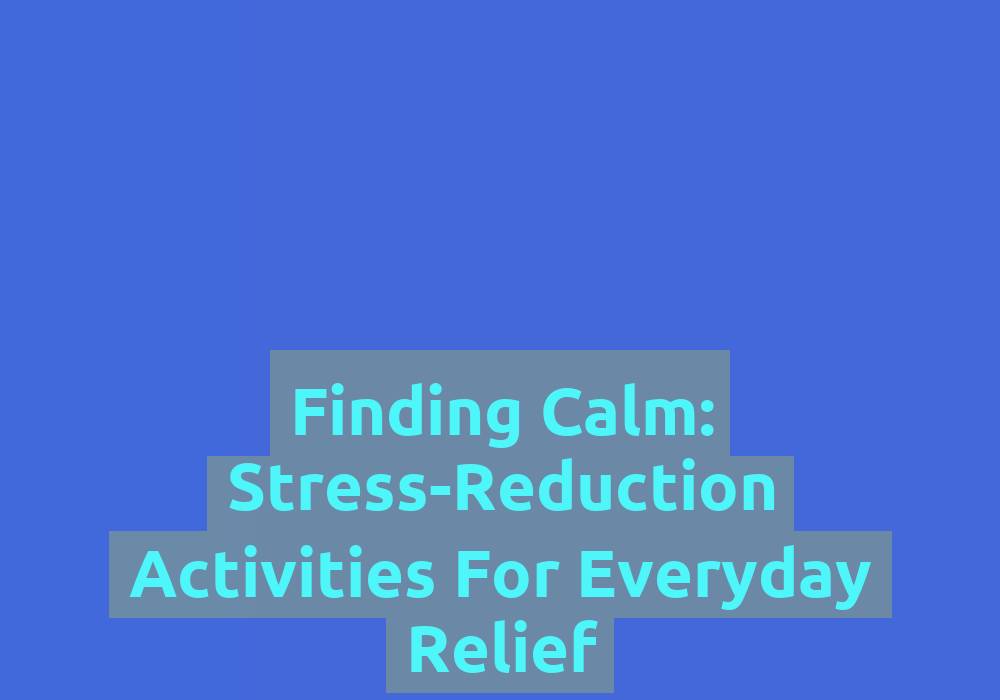Finding Calm: Stress-Reduction Activities for Everyday Relief

In today’s fast-paced world, stress has become an all-too-familiar companion for many individuals. The constant demands of work, family, and personal life can easily overwhelm us, leaving us feeling anxious and exhausted. However, it is essential to prioritize our mental and emotional well-being. By incorporating stress-reduction activities into our daily routine, we can find the calm and peace we so desperately need. In this article, we will explore various strategies and techniques that can help us achieve everyday relief from stress.
Practice Mindfulness and Meditation
One of the most effective ways to counter stress is through the practice of mindfulness and meditation. These techniques allow us to focus on the present moment, reducing the impact of external stressors on our mental state. Mindfulness involves paying attention to our thoughts, feelings, and sensations without judgment, while meditation involves training our minds to achieve a state of deep relaxation and focus. Here are some steps to get started:
- Find a quiet and comfortable place where you can sit or lie down without distractions. Creating a peaceful environment will help you immerse yourself in the practice.
- Close your eyes and take a few deep breaths, allowing your body to relax. Deep breathing helps activate the body’s relaxation response and brings a sense of calm.
- Bring your attention to your breath, taking note of each inhale and exhale. Focus on the sensation of your breath entering and leaving your body.
- As thoughts arise, acknowledge them without judgment and gently bring your focus back to your breath. It’s normal for the mind to wander during meditation, but the key is to gently redirect your attention to the present moment.
- Start with a few minutes of practice each day and gradually increase the duration as you become more comfortable. Consistency is key in reaping the benefits of mindfulness and meditation.
In addition to these steps, there are various mindfulness and meditation techniques you can explore, such as body scan meditation, loving-kindness meditation, and guided imagery. These practices can help reduce stress, improve focus, and promote overall well-being.
Engage in Physical Activity
Regular exercise is not only beneficial for our physical health but also plays a crucial role in reducing stress. Engaging in physical activity releases endorphins, which are natural mood boosters. Endorphins act as the body’s natural painkillers and can help improve mood and reduce feelings of stress and anxiety. Here are some options to consider:
- Aerobic Exercise: Activities such as running, swimming, or cycling can increase your heart rate and stimulate the release of endorphins, promoting a sense of well-being and reducing stress. Aim for at least 150 minutes of moderate aerobic exercise per week or 75 minutes of vigorous exercise.
- Yoga and Pilates: These mind-body practices combine physical movement with breathing exercises and meditation. They help improve flexibility, reduce muscle tension, and calm the mind. Consider joining a yoga or Pilates class or following online tutorials to incorporate these practices into your routine.
- Walking in Nature: Spending time in nature has been shown to have a calming effect on the mind. Take a stroll in a park or go for a hike to enjoy the benefits of fresh air and natural surroundings. Walking in nature not only provides physical exercise but also allows you to connect with the beauty of the natural world, helping to reduce stress and improve overall well-being.
Remember, finding an activity that you enjoy is key to sticking with it. Whether it’s dancing, playing a sport, or doing martial arts, incorporating physical activity into your daily routine can have a profound impact on your stress levels and overall mental health.
Prioritize Self-Care Activities
Taking care of yourself is crucial for managing stress. Prioritizing self-care activities can help you relax, rejuvenate, and restore your inner balance. Here are some ideas:
- Take a Bath: Draw a warm bath, add some relaxing essential oils or bath salts, and indulge in a soothing soak. This simple act can help ease muscle tension and promote relaxation. Consider adding lavender or chamomile essential oils, known for their calming properties.
- Practice Self-Compassion: Treat yourself with kindness and understanding. Engage in activities that bring you joy and make time for hobbies or interests that you love. This could involve listening to music, reading a book, practicing a craft, or engaging in any activity that brings you a sense of fulfillment and happiness.
- Get Sufficient Sleep: Lack of sleep can exacerbate stress levels. Prioritize a consistent sleep schedule and create a relaxing bedtime routine to ensure quality rest. Establish a regular sleep-wake cycle, limit exposure to screens before bed, and create a comfortable sleep environment that promotes relaxation.
- Connect with Loved Ones: Spending time with family and friends can provide emotional support and help alleviate stress. Engage in meaningful conversations, share your thoughts and feelings, and enjoy shared activities. Whether it’s having a meal together, going for a walk, or simply spending quality time, nurturing your relationships can have a positive impact on your overall well-being.
Remember, self-care is not selfish; it’s necessary for your mental and emotional health. Prioritizing activities that bring you joy and relaxation is an essential part of managing stress and maintaining a healthy balance in life.
Cultivate a Healthy Lifestyle
Maintaining a healthy lifestyle can significantly contribute to stress reduction. Here are some lifestyle habits to incorporate into your routine:
- Healthy Eating: Opt for a balanced diet rich in fruits, vegetables, whole grains, and lean proteins. Eating a variety of nutrient-dense foods provides the necessary vitamins and minerals to support your body’s stress response. Additionally, limit processed foods, sugary snacks, and excessive caffeine, as these can exacerbate stress levels.
- Limit Alcohol and Nicotine: While these substances may provide temporary relief, they can actually increase anxiety in the long run. Moderation is key when it comes to alcohol consumption, and quitting smoking can have numerous benefits for your overall health and stress levels.
- Practice Time Management: Prioritize your tasks, set realistic goals, and create a schedule that allows for breaks and relaxation. Effective time management can help reduce feelings of being overwhelmed and increase productivity. Break down tasks into smaller, manageable steps, delegate when possible, and learn to say no to additional commitments when necessary.
- Unplug from Technology: Constant exposure to technology can contribute to stress. Set aside dedicated time to disconnect from screens and engage in activities that promote relaxation and mindfulness. This could involve reading a book, practicing a hobby, or simply spending time in nature without the distractions of technology.
Remember, cultivating a healthy lifestyle is a gradual process. Start by making small changes and gradually incorporate healthier habits into your routine. The key is to be consistent and prioritize your well-being.
Seek Professional Help
If stress becomes overwhelming and starts to interfere with your daily life, it is important to seek professional help. A mental health professional can provide guidance, support, and additional coping strategies tailored to your individual needs. They can help you explore the root causes of your stress, develop healthy coping mechanisms, and provide a safe space for you to express your emotions.
Remember, managing stress is an ongoing process that requires commitment and self-care. By incorporating these stress-reduction activities into your everyday routine, you can find the calm and relief you deserve. Prioritize your well-being, and take the necessary steps to lead a more balanced and fulfilling life.
Note: This article is written in markdown format.
Q: What are some stress-reduction activities I can incorporate into my daily routine?
A: Some stress-reduction activities you can incorporate into your daily routine include mindfulness and meditation, engaging in physical activity, prioritizing self-care activities, and cultivating a healthy lifestyle.
Q: How can mindfulness and meditation help reduce stress?
A: Mindfulness and meditation can help reduce stress by allowing us to focus on the present moment and reducing the impact of external stressors on our mental state. These practices involve paying attention to our thoughts, feelings, and sensations without judgment and training our minds to achieve a state of deep relaxation and focus.
Q: How can physical activity help in reducing stress?
A: Physical activity releases endorphins, which are natural mood boosters and can help improve mood and reduce feelings of stress and anxiety. Engaging in activities such as aerobic exercise, yoga and Pilates, and walking in nature can promote a sense of well-being and reduce stress.
Q: Why is self-care important for managing stress?
A: Self-care is important for managing stress because it helps us relax, rejuvenate, and restore our inner balance. Taking care of ourselves through activities like taking a bath, practicing self-compassion, getting sufficient sleep, and connecting with loved ones can contribute to our overall mental and emotional health.

